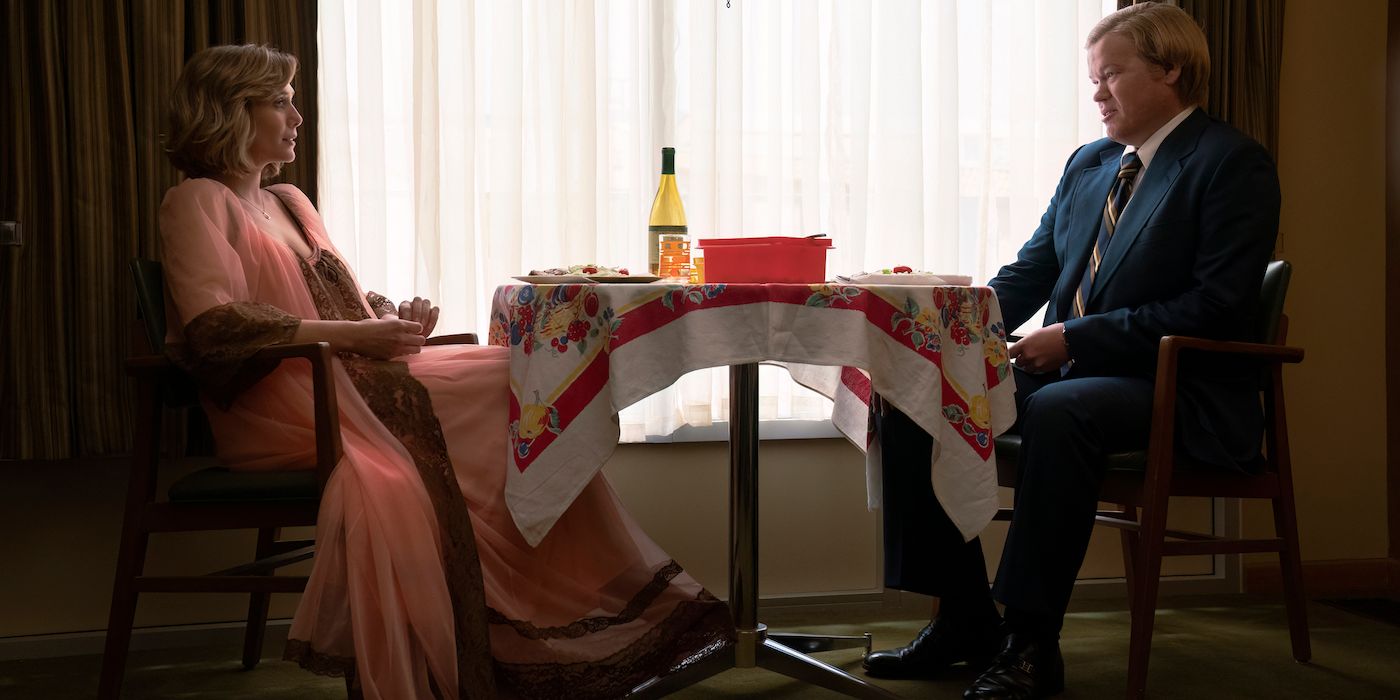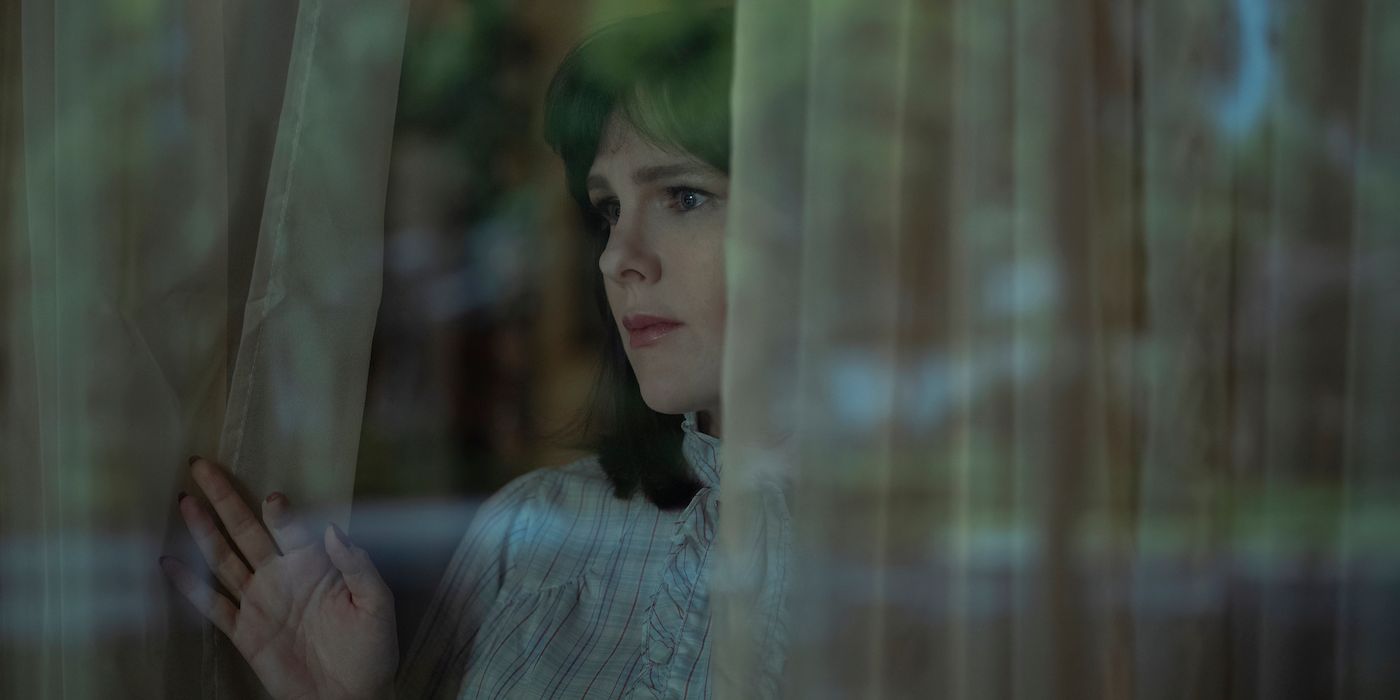Many works of film and TV seem to distill their thematic interests down into a single line of dialogue that, once heard, makes legible all the creative choices made throughout. In Love & Death, the new HBO miniseries from showrunner David E. Kelley, that key comes in the later episodes, when a newscaster describes the central court case as having gone from a whodunit to a "whydunit." Though it presents its real-life story with no small degree of dramatic flair (sometimes to its detriment), the storytelling is defined by clarity — we're shown what happens and given no reason to doubt what we see. What's really being explored, by pulling all attention to the actors' performances, is why these people behave as they do, and that's where Love & Death becomes much more slippery.
Based on journalistic accounts of the real murder trial by Jim Atkinson and John Bloom, Kelley's series is set in Texas over a period of two years, from 1978-80, and essentially divides itself into two sections. The first, told over episodes 1-3, sees Candy Montgomery (Elizabeth Olsen) embark on an affair with Allan Gore (Jesse Plemons) as they both grapple with their relationships with their respective spouses, Pat (Patrick Fugit) and Betty (Lily Rabe). The second, spanning episodes 4-7, begins when Betty is brutally killed with an ax, a crime for which Candy emerges as the seemingly improbable prime suspect. The case's particulars, nestled as it is in a small-town community rarely marred by violence of any kind, soon make it the subject of national media attention.
But while the public's fascination is driven by a sense of mystery over what really happened that day, Love & Death makes no effort to hide her killer's identity, nor the circumstances that brought about her death. This fictional world renders the truth accessible in a way it isn't in reality — an artistic choice that clears the way for the project's true interests, yes, but not without raising ethical questions. In a purported dramatization of a true story, the show takes certain versions of events as givens when they perhaps shouldn't be, and when they aren't in its own court of law. The degree to which the story's intrigue is used to propel the later episodes only makes this more troublesome, and you may feel this narrative allegiance ultimately leaves the series a straightforward, skin-deep revisit of a tale told in miniseries form just last year with Hulu's Candy starring Jessica Biel.
But if it does become too fascinated by an admittedly intriguing case to reach the full potential of its premise, Kelley's show doesn't walk this path without purpose. Love & Death believes the stories of the people involved to better imagine them as characters: What does this version of events, when accepted as truth, reveal about those who lived them? Who must they be to have done these things? Considered in this light, the storytelling looks intentionally provocative, and had the characters been presented with the same certainty, the aforementioned dismissal might have proven accurate. Thankfully, the filmmaking is less willing to accept the stories they tell others (and themselves) about who they are.
This interrogation of identity and motivation is baked into the writing — Candy has debrief sessions with her friend Sherry Cleckler (Krysten Ritter) throughout the affair, and her account of her thoughts and feelings seldom fits with what the audience was just shown. But most of it occurs at the level of performance. This small Texas community is all about those suburban WASP façades and Candy keeps hers absolutely pristine, but Olsen gives flashes of resentment and possessive competitiveness bubbling underneath. Allan and Pat are twinned as milquetoast men at first, but the emotional truths driving their demeanors prove quite different; casting Plemons, an actor who excels at giving depth to understated roles, as the almost frustratingly vacant Allan is a stroke of genius.
Director Lesli Linka Glatter is given a talented cast to work with and wisely keeps the camera pointed at their faces whenever possible, keeping the viewer's attention on externalizations of the characters' inner lives. The actors were clearly afforded the space to be reactive on set, as well, and moments like Candy and Allan's first illicit encounter are electric to watch. The supporting players are game to keep pace, with Tom Pelphrey's lawyer Don Crowder bringing an enjoyable level of bluster to the back half, but Love & Death is undeniably Olsen's show. Her ability to take various, contradictory traits and make them feel of a piece turns Candy into a compelling enigma who at any given moment can go from simple to unfathomably complex and everywhere in between. There is more reason to recommend it, but this series would be worth it just to watch what Olsen does with a role this nuanced.
Love & Death episodes 1-3 become available to stream on HBO Max Thursday, April 27, with the remaining four episodes releasing weekly until May 25. The miniseries is rated TV-MA.



